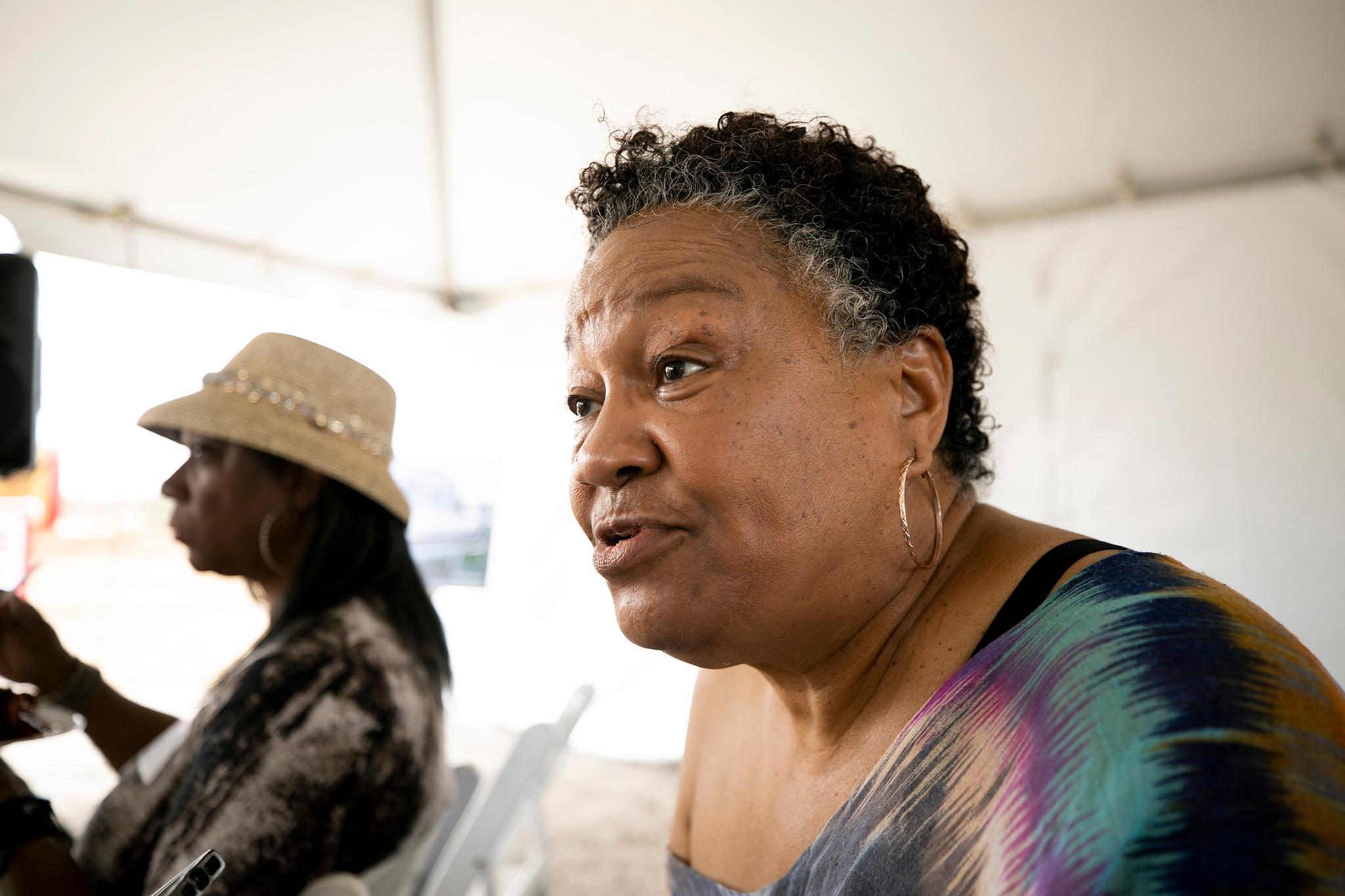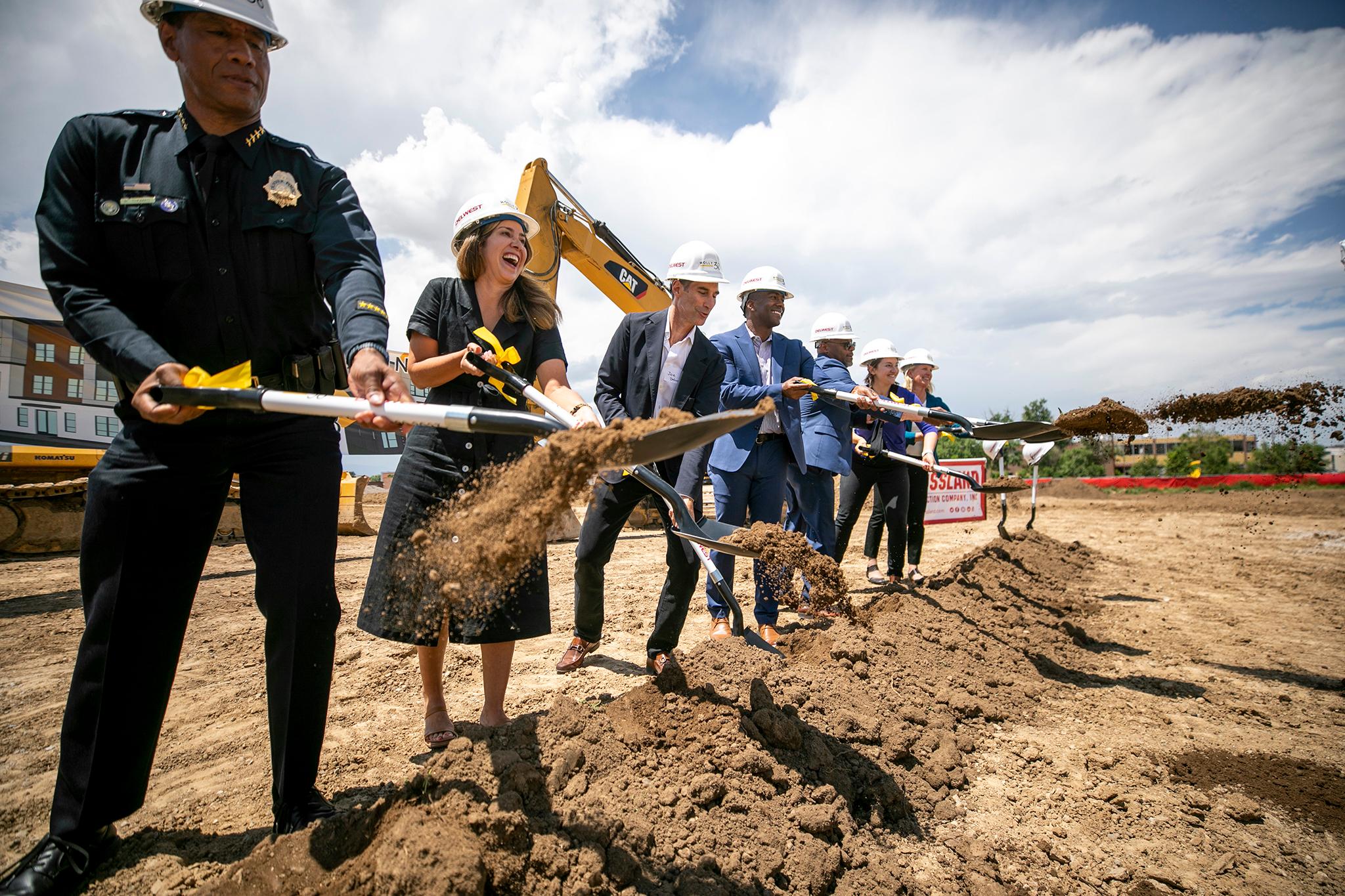For weeks, bulldozers have been digging up the old Metro Taxi lot at 38th Avenue and Holly Street, in Northeast Park Hill. They're making way for Denver's largest income-restricted housing project since outgoing Mayor Michael Hancock formed the Department of Housing Stability (HOST) in 2019.
The new development is sandwiched between residential Northeast Park Hill, a community of mostly one-story brick ranch houses built after World War II, and an industrial part of the neighborhood that Mayor-elect Mike Johnston said would likely see an increase in development in the next couple of decades.
Longtime community organizer LaMone Noles said she expects the arrival of that development as well, and she's afraid the longtime Black residents who have lived in nearby houses -- some since the '60s -- will be strategically priced out by skyrocketing property taxes as new development arrives. It's happened in cities nationwide, and she's watched it here, too, with the city doing too little to stop displacement, she said. In many cases, she feels the city has enabled it.
City officials say the new income-restricted housing will keep low- and middle-income residents in the community.
The new project will include a mix of home sizes, including a number of three- and four-bedroom units for larger families, plus a clubhouse with an educational wing dedicated to early childhood learning.
Delwest Development Corporation, the project's developer, dubbed it Holly38. It will include 253 income-restricted homes.

"This development, when placed in service and open for occupancy, will serve incomes from 30% of the area median income all the way up to 80% of the area median income," said Kathryn Grosscup, of the Colorado Housing and Finance Authority, which used low-income housing tax credits to help fund the project. "So this could be households with incomes at $30,000 a year or less all the way up to households who have $80,000 a year or less."
Some residents, who receive vouchers from the Denver Housing Authority, will pay no more than 30% of their income on rent -- even if they're earning nothing, according to a release from the Department of Housing Stability.
"Don't let anyone tell you Denver is sleeping on affordable housing," said Hancock.
As he departs, well aware that Denver's cost of living has driven many longtime residents out, Hancock's pointing to the things his administration was able to do to try to keep people housed in town.
"Since July 2011, the Hancock Administration has supported the building or preservation of over 10,000 affordable units in neighborhoods across the city," according to a statement from HOST. "A total of 1,611 affordable units that have received city financing are currently under construction at 16 sites throughout Denver. An additional 541 income-restricted units are in the planning stage."

Mathematically speaking, that's a fraction of what's needed. Denver Housing Authority Executive Director David Nisivoccia recently told Denverite the total number of income-restricted units Denver needs to catch up with demand is closer to 60,000 and growing, as affordability becomes an increasing concern across the city.
But every unit helps, and the city and developers are quick to celebrate them all.
"If you're gonna end on a note, this is the note that you end on," said District 8 Councilmember Chris Herndon, who is also finishing his own final term.
He celebrated Delwest's communication with the neighborhood and how "they wanted to make sure this community was going to be for this community, and there were countless conversations they had. Delwest came to the table, and that should be applauded, because a lot of builders don't engage community the way that Delwest did."
Too much of the community outreach has taken place outside the neighborhood and in South Park Hill, said Noles, head of the East Denver Residents Council, while attending the groundbreaking.
Noles felt the developer could have done more to speak to people living across the street from the property under development. Neighbors were taken off guard when construction fences went up and bulldozing began, and only then, according to Noles, did the developer really engage locally.
Too often when developers reach out to registered neighborhood organizations in the area, they focus on the Greater Park Hill Community Inc., which represents the area but is located in the wealthier, whiter Park Hill, south of Martin Luther King Jr. Boulevard, Noles explained. Delwest would have done better to speak more to the Northeast Park Hill Coalition, which solely represents the community where the Holly38 is being built.
Neighbors have expressed concerns about limited parking, the effects of construction on their quality of life, and a lack of engagement with the project.

"It's gonna be a lot of disruption for the neighborhood," Noles said. "And that's the hard part. We've got a lot of seniors that live here."
She was troubled by officials at the groundbreaking characterizing the surrounding community as poor -- particularly since many people in the area have paid their homes in full.
"When I hear the word poor directed at folks who are homeowners, how are they poor if they own?" she asked.
Noles is also concerned that the developers and investors are the only people getting wealthy from the development. She fears surrounding neighbors, who have been paying property taxes for decades, will see no return, and she plans to advocate for that to change.
"We're just going to monitor what they're doing," she said. "And we also expect them to keep the community through the neighborhood organizations up to date on what they're doing to minimize any types of conflicts."
She also wants to see more commercial activity in the area, and remembers fondly when Northeast Park Hill was a walkable, mixed-use community, with vibrant commerce in Holly and Dalhia squares and plenty of jobs from nearby Stapleton Airport.
"This neighborhood here was set up to fail years ago, and it didn't," she said. "It went from a neighborhood to a community, and people have raised generations of children here. We had neighborhood schools. We also had our own retail -- commerce that has been taken out. And it concerns me, because when a neighborhood doesn't have their own commerce, then they are going to be targeted for extinction."
Helen Bradshaw, a resident in the area, fought for the redevelopment of the nearby Park Hill Golf Course.
She was disappointed that voters shot down the proposal that would have brought the neighborhood housing, commerce, space for a grocery store and the city's fourth largest park all to protect a private golf course. That's in the past now, and she sees possibility again in Holly38.
"I believe that this is a start," she said, but it's not everything. "We need resources and opportunity, not just housing in the neighborhood."

Bradshaw sees Holly38 as the start of what could have been created at the Park Hill Golf Course site -- even if there is still no plan for what that project promised. Still, she has hope that changes are coming.
"We're getting community started," she said, looking out at the future home of Holly38. "We just started right here."











